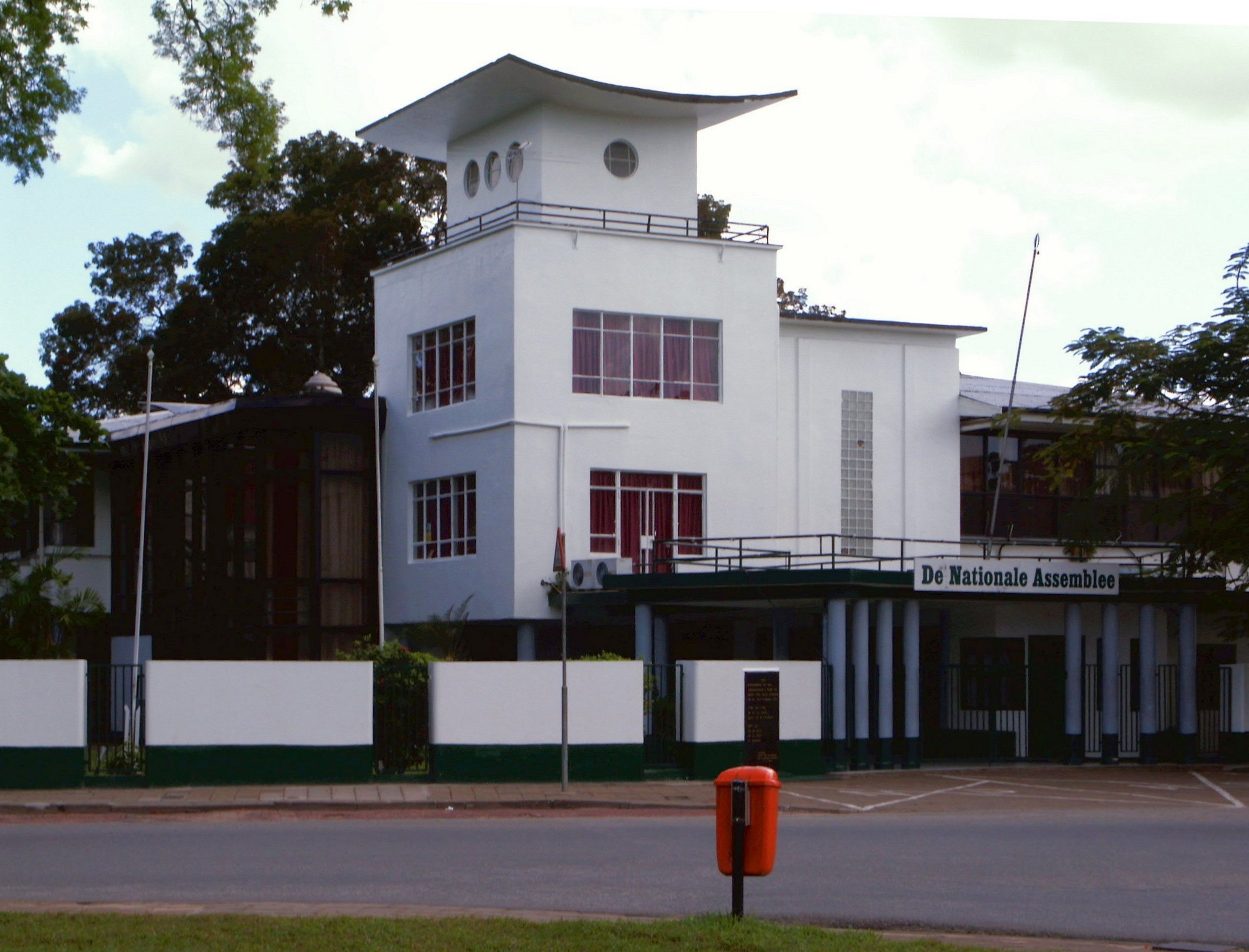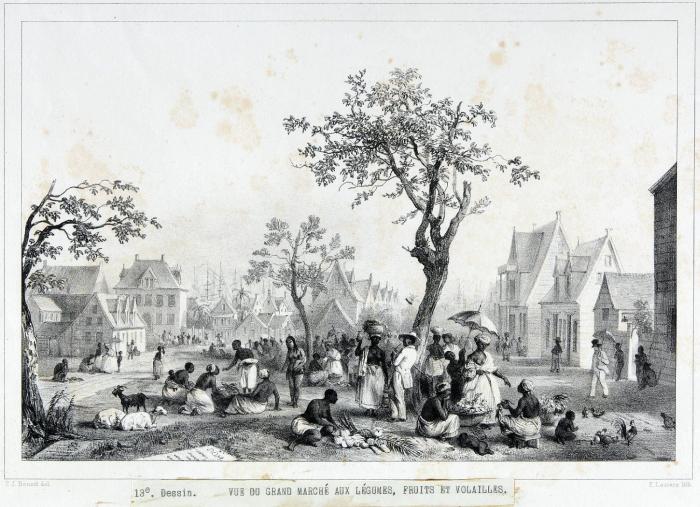|
National Assembly (Suriname)
The National Assembly (, commonly abbreviated "DNA") is the Parliament, representing the legislative branch of government in Suriname. It is a unicameral legislature. The assembly has been situated in the former park house at the Independence Square in Paramaribo, after a fire destroyed the old building of representation on 1 August 1996. A reconstruction of the old building was completed in 2022. The 51 members of parliament are elected every five years by open list proportional representation on the basis of the country's component districts. The most recent elections were held on 25 May 2025. The current Chairman of the Assembly, Marinus Bee, was appointed on 14 July 2020. Dew Sharman was appointed as Vice Chairman on 29 June 2020. History The first legislature of Surinam was the Colonial States, which first met in 1866. The name was changed to Estates of Suriname in 1936. When Suriname became an independent republic on 25 November 1975, the legislature was renamed the ... [...More Info...] [...Related Items...] OR: [Wikipedia] [Google] [Baidu] |
List Of Chairmen Of The National Assembly Of Suriname
The chairman of the National Assembly of Suriname () is the Speaker (politics), presiding officer of the National Assembly (Suriname), National Assembly of Suriname. List of chairmen The following is a complete list of office-holders since independence in 1975: ;Political parties Timeline See also * List of chairmen of the Estates of Suriname Notes References {{DEFAULTSORT:List of chairmen of the National Assembly of Suriname Lists of legislative speakers, Suriname Lists of political office-holders in Suriname, Chair Speakers of the National Assembly (Suriname), * ... [...More Info...] [...Related Items...] OR: [Wikipedia] [Google] [Baidu] |
Legislature
A legislature (, ) is a deliberative assembly with the legal authority to make laws for a political entity such as a country, nation or city on behalf of the people therein. They are often contrasted with the executive and judicial powers of government. Legislatures can exist at different levels of government–national, state/provincial/regional, local, even supranational (such as the European Parliament). Countries differ as to what extent they grant deliberative assemblies at the subnational law-making power, as opposed to purely administrative responsibilities. Laws enacted by legislatures are usually known as primary legislation. In addition, legislatures may observe and steer governing actions, with authority to amend the budget involved. The members of a legislature are called legislators. In a democracy, legislators are most commonly popularly elected, although indirect election and appointment by the executive are also used, particularly for bicameral legis ... [...More Info...] [...Related Items...] OR: [Wikipedia] [Google] [Baidu] |
List Of Chairmen Of The Estates Of Suriname
The chairman of the Estates of Suriname () was the presiding officer of the Estates of Suriname. List of chairmen The following is a complete list of office-holders from 1935 to 1975: ;Political parties See also * List of chairmen of the National Assembly of Suriname * List of colonial governors of Suriname References {{DEFAULTSORT:List of chairmen of the Estates of Suriname Suriname Suriname, officially the Republic of Suriname, is a country in northern South America, also considered as part of the Caribbean and the West Indies. It is a developing country with a Human Development Index, high level of human development; i ... Lists of political office-holders in Suriname * Political history of Suriname Netherlands–Suriname relations ... [...More Info...] [...Related Items...] OR: [Wikipedia] [Google] [Baidu] |
Jagernath Lachmon
Jagernath Lachmon, also Jaggernath Lachmon, (21 September 1916 – 19 October 2001) was a Surinamese politician. He was one of the founders of the Progressive Reform Party (VHP), an Indo-Surinamese party founded in 1947 of which he served as President until his death. Biography Lachmon was born in Corantijnpolder in the district of Nickerie. The youngest child of six, his parents were contract laborers from Uttar Pradesh to Suriname. His father was a cook and his mother clipped cane on the plantation Waterloo. His parents had chosen the surname Lachmon when they arrived at the plantation. Later, his parents started a small dairy farm in Nieuw Nickerie. Lachmon left for Paramaribo when he was thirteen, and completed his school qualifications. On the advice of one of his teachers, he decided to practise law. At that time, there were restrictions about legal studies in Suriname. After a long search, he found the creole lawyer Julius Caesar de Miranda who became mentor. Surprised ... [...More Info...] [...Related Items...] OR: [Wikipedia] [Google] [Baidu] |
Emile Wijntuin
Emile Linus Alfred Wijntuin (22 September 1924 – 7 May 2020) was a Surinamese politician who served as Chairman of the National Assembly of Suriname from 1975 until the aftermath of the 1980 Surinamese coup d'état. Wijntuin was a member of the Progressive Surinamese People's Party (PSV). Biography Wijntuin was born in the Coronie District on 22 September 1924 in a family of farmers. At age 12, he was sent to Paramaribo for high school education. In 1943, he became an assistant teacher and received his teaching degree in 1947. During this period, he befriended father Jozef Weidmann and became interested in politics. In August 1926, Weidmann was one of the founders of PSV, a Christian democratic party. Wijntuin joined the PSV shortly after its foundation. He first ran for office in 1955, but lost to Johan Kraag. From 1958 to 1967 and 1968 to 1980, he was a member of the National Assembly. Wijntuin became chairman of PSV in 1971. He served as the Chairman of the Estates of ... [...More Info...] [...Related Items...] OR: [Wikipedia] [Google] [Baidu] |
Nationale Assemblée, Seen From Suriname River
Nationale is a World Cup downhill ski course in Crans-Montana, Switzerland, opened in 1940. Crans-Montana hosted the World Championships in 1987, and Swiss racers (Pirmin Zurbriggen, Maria Walliser, Erika Hess, and Peter Müller) dominated in front of the home crowd, winning eight of the ten events and fourteen of the thirty medals. In addition to Nationale, two nearby ski courses also hosted events at those World Championships; nearby " Mont Lachaux" was the women's downhill course and "Chetzeron" in Crans village. Course The course's World Cup debut came in January 1977, with women's events in downhill, slalom, and combined. The men's World Cup events on this slope premiered in 1979 Events January * January 1 ** United Nations Secretary-General Kurt Waldheim heralds the start of the ''International Year of the Child''. Many musicians donate to the ''Music for UNICEF Concert'' fund, among them ABBA, who write the song ... with slalom. Sections * Dévers De ... [...More Info...] [...Related Items...] OR: [Wikipedia] [Google] [Baidu] |
Resorts Of Suriname
The districts of Suriname, ten districts of Suriname are divided into 63 resorts (Dutch language, Dutch: ''ressorten''). Within the capital city of Paramaribo, a resort entails a neighbourhood; in other cases it is more akin to a municipality, consisting of a central place with a few settlements around it. The resorts in the Sipaliwini District are especially large, since the interior of Suriname is sparsely inhabited. The average resort is about and has almost 8,000 inhabitants. According to article 161 of the Constitution of Suriname, the highest political body of the resort is the resort council. Elections for the resort council are held every five years and are usually at the same time as the Elections in Suriname, Suriname general elections. Overview map List of resorts The resorts are listed below, according to district. Brokopondo District The Brokopondo District consists of the following resorts: Commewijne District The Commewijne District consists of the followi ... [...More Info...] [...Related Items...] OR: [Wikipedia] [Google] [Baidu] |
Coup D'état
A coup d'état (; ; ), or simply a coup , is typically an illegal and overt attempt by a military organization or other government elites to unseat an incumbent leadership. A self-coup is said to take place when a leader, having come to power through legal means, tries to stay in power through illegal means. By one estimate, there were 457 coup attempts from 1950 to 2010, half of which were successful. Most coup attempts occurred in the mid-1960s, but there were also large numbers of coup attempts in the mid-1970s and the early 1990s. Coups occurring in the post-Cold War period have been more likely to result in democratic systems than Cold War coups, though coups still mostly perpetuate authoritarianism. Many factors may lead to the occurrence of a coup, as well as determine the success or failure of a coup. Once a coup is underway, coup success is driven by coup-makers' ability to get others to believe that the coup attempt will be successful. The number of successful cou ... [...More Info...] [...Related Items...] OR: [Wikipedia] [Google] [Baidu] |
Districts Of Suriname
Suriname is divided into 10 districts (). Overview History The country was first divided up into subdivisions by the Dutch on October 8, 1834, when a Royal Decree declared that there were to be 8 divisions and 2 districts: *Upper Suriname and Torarica *Para *Upper Commewijne *Upper Cottica and Perica *Lower Commewijne *Lower Cottica *Matapica *Saramacca *Coronie (district) *Nickerie (district) The divisions were areas near the capital city, Paramaribo, and the districts were areas further away from the city. Suriname Districten 1914-1917.png, Suriname districts 1914-1917 Suriname Districten 1958-1967.png, Suriname districts 1958-1967 Suriname Districten vanaf 1 jan 1968.png, Suriname districts 1968-1985 In 1927, Suriname's districts were revised, and the country was divided into 7 districts. In 1943, 1948, 1949, 1952 and 1959 further small modifications were made. In 1968 the districts were redrawn again, into *Nickerie *Coronie *Saramacca *Brokopondo *Para *Suriname *Pa ... [...More Info...] [...Related Items...] OR: [Wikipedia] [Google] [Baidu] |
Open List
Open list describes any variant of party-list proportional representation where voters have at least some influence on the order in which a Political party, party's candidates are elected. This is as opposed to closed list, in which party lists are in a predetermined, fixed order by the time of the election and gives the general voter no influence at all on the position of the candidates placed on the party list. An open list system allows voters to select individuals rather than, or in addition to parties. Different systems give the voter different amounts of influence to change the default ranking. The voter's candidate choices are usually called preference vote; the voters are usually allowed one or more preference votes for the open list candidates. Open lists differ from mixed-member proportional representation, also known as "personalized proportional representation" in Germany. Some Mixed electoral system, mixed systems, however, may use open lists in their list-PR compon ... [...More Info...] [...Related Items...] OR: [Wikipedia] [Google] [Baidu] |
Paramaribo
Paramaribo ( , , ) is the capital city, capital and largest city of Suriname, located on the banks of the Suriname River in the Paramaribo District. Paramaribo has a population of roughly 241,000 people (2012 census), almost half of Suriname's population. The historic inner city of Paramaribo has been a UNESCO World Heritage Site since 2002. Name The city is named for the Paramaribo tribe living at the mouth of the Suriname River; the name is from Tupi–Guarani languages, Tupi–Guarani ''para'' "large river" + ''maribo'' "inhabitants". History The name Paramaribo is probably a corruption of the name of a native village, spelled Parmurbo in the earliest Dutch sources. This was the location of the first Dutch settlement, a trading post established by Nicolaes Baliestel and Dirck Claeszoon van Sanen in 1613. English and French traders also tried to establish settlements in Suriname, including a French post established in 1644 near present-day Paramaribo. All earlier settle ... [...More Info...] [...Related Items...] OR: [Wikipedia] [Google] [Baidu] |






